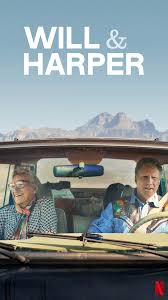
WILL AND HARPER
US, 2024, 115 minutes, Colour.
Will Ferrell, Harper Steele, and many connections from Saturday Night Live.
Directed by Josh Greenbaum.
Since the end of World War II but, especially from the 1960s on, there have been a vast number of changes in perspective on so many issues: racial equality, colonialism, communism and capitalism, refugees, disability, poverty, sexuality… We talk about them much more openly as years go on. We have experiences, for instance with migrants, opening up greater understanding. And the media, and social media…
Some of us, perhaps immediately disconcerted by new experiences, open our minds and hearts and experience a change. Some of us, shocked, threatened, hold fast to what has been handed on to us whether we understand it or not, refusing to let go.
These are some of the thoughts that come to mind immediately with Will and Harper. And, it is specifically the issue of gender identification, even more specifically, transitioning, the experience and the consequences.
When longtime friend for almost 30 years, writer for Saturday Night Live and movies for Will Ferrell, Andy Steele, emailed Ferrell to let him know that Andy was now a dead name and that she had transitioned to Harper Steele, Ferrell, like so many others, was surprised. And he came up with the idea, because of Harper’s previous now joy in driving across the United States, that they should travel together, an opportunity for discussion, for Ferrell to ask, for Harper to reflect, communicate what her life’s experience had been and now was to be.
And this film is an invitation for audiences to come along for the ride, for the experiences, for asking questions, hearing responses, empathising with the responses, learning and incorporating new perspectives.
Cameras were fitted to the front of the vehicle – but, they are at all times on occasions unobtrusive, the whole trip seeming realistic, as if we are there, observing, participating.
240 hours of film were taken but reduced to just under two hours, a variety of episodes, initial discussion with Harper’s two children and their views and experience, a visit to the Saturday Night Live set, a basketball game in Indiana, a bar in Oklahoma, a steak-eating competition in Texas, a hot air balloon ride in New Mexico. But, all the time, getting to know Harper Steele, hearing about her life, growing up in Iowa (and a visit to her sister there), self-doubts, settled for decades, therapy, decision, procedures, and the realisation that this trip was an opportunity for her to venture into familiar places in her new identity, apprehensive, sometimes reassured, some wonderful conversations but also the target of vitriolic trolling.
A two hour film where we get to know central characters offers a fine opportunity, sometimes a challenging opportunity, to understand someone, and to walk in their shoes…
- The title, introducing Will Ferrell, introducing Harper Steele?
- Audiences responding to the back story, Andrew Steele, years as a writer, Saturday Night Life, Will Ferrell’s films? Friendship with Ferrell, with the Saturday Night Life team? Andrew, marriage, children? Yet the unease, identity, gender, women’s clothes, secrecy, therapy, decision to transition, the consequences, new name, Andrew as a dead name, facing a future in his late 50s? To go out into the world with his female identity?
- Discussions about transition in the 21st-century, the past, precedents, more liberal interpretations, Conservative interpretations and condemnations of transition? Political responses, especially in the United States?
- Will Ferrell, the email giving him the information, his response, the years of friendship, the proposal of the trip, talking together, his being able to ask questions, Harper able to respond, the filming, for the record, the various activities, Ferrell inviting the audience to journey with them and share the experience?
- The importance of the initial encounter with the children and their response? The visit to Saturday Night Live at the affirmation from the friends on the set?
- The journey, the camera, unobtrusive, audiences accepting watching the couple driving, in the car, the various activities? Harper emerging, memories of the past and being accepted, wondering about acceptance now?
- The audience enjoying the activities, the basketball game, the racing cars, the hot air balloon, the night at the club in Oklahoma, Texas and the steak eating and the hostile crowd? And the visit to the hometown, and the discussions with Harper’s sister?
- The range of questions that Will Ferrell asks, questions the audience would want to ask, Harper and the probing, self questioning, realisations, apprehensions, to be appreciated, self-worth, the surprising positive reactions, Indiana and the meeting of the governor and learning of his anti-legislation? At the club in Oklahoma, the positive reactions and acceptance? The trolling and the messages after the visit in Texas?
- The realisation that an experience of a person transitioning makes a difference from theoretical analysis of the pros and cons?
- Audiences with fixed ideas, inherited, narrow, fearful? Those who invoke moral issues?
- The effect of this journey, getting to know Harper, audiences overcoming any initial fears, prejudices, the move to acceptance?